With the IBA trade show less than two months away, what product trends and equipment developments can visitors expect to be on display?
Three years is a long time in any industry, and the demands of bakery consumers and suppliers have certainly evolved since the last IBA show took place in 2015.
Keeping abreast of these market trends is one of the key reasons around 80,000 visitors are expected to visit Munich in September for what many view as the premier international bakery event. More than 1,300 ingredient, equipment and service providers will be exhibiting alongside a host of demonstrations, competitions and lectures.
“IBA is a central platform for the baking industry, whether you are from the industrial or craft sector,” explains Brian Clarke of European Food Consultants. “It showcases the latest trends and new product ideas in addition to latest development and design of equipment.”
And when it comes to equipment, one word on the lips of many suppliers and buyers is ‘flexibility’.
Today’s fast-moving bakery market – in which new tastes and diets can explode from fad to mainstream in months – means the demands on machinery have never been greater.
“Due to the nature and sometimes short lifespan of new products, highly flexible machines are required to future-proof and cost-justify capital equipment investments, along with the ever-growing need to have the most energy-efficient equipment available to reduce running costs,” says Spooner Industries sales manager Michael Lomas. The company has also found that demand for multi-level production lines has increased, and has been driven by the need for bakery equipment that can produce more products in the same footprint as an existing piece of kit.
“There is a trend towards evermore flexible and powerful production systems,” says Richard Tearle, general manager at Rondo, adding that equipment buyers increasingly demand properties to help maintain hygiene.
Rondo is also seeing a new trend for the digitalisation of production processes to minimise the downtime of plants.
It’s a view echoed by Baker Perkins, which says increasing efficiency while lowering production costs continue to be key drivers, and Tromp, which is seeing demand for a reduction in operational and engineering labour costs through reliable automated systems.
Also a big driver of equipment development is the need for large-scale production of artisan-style goods and items tapping special dietary needs.
“The baking industry is, and remains, very diverse,” says Tearle.
“The most important trends are certainly the industrial production of ‘artisanal’ products. Furthermore, the focus in central Europe is on efficient solutions for the production of functional food and gluten-free products.”
And this is expected to continue.
“Alongside growing consumer interest in health and wellbeing, burgeoning diets and lifestyles, such as veganism, gluten-free and dairy-free, are becoming increasingly mainstream,” says Mona Schmitz-Huebsch, senior marketing manager at Ingredion.
“It’s clear to see there are many trends for bakers to balance – from the surge in demand for artisan and rustic breads, to high-protein snacks or gluten-free muffins. This means manufacturers are under constant pressure to develop and deliver their products to market more quickly, as consumers search for new and different experiences that meet their needs.”
As Andrew Turner, bakery product manager for the UK and Ireland at Handtmann, puts it: “These are exciting times for the UK bakery sector.
“Never before has the customer had so much choice and producers have never been under so much pressure to produce high-quality products at a low price.”
He adds that this has meant the market for dough products has continued to develop dynamically over the years.
%%Quote_35%%
“The consumption of bread is always at a high level, but in recent years consumers have come to expect higher-quality and more diverse products, and the ability to purchase them from both the corner baker and the larger retailers.”
In Handtmann’s case, this has led to the development of equipment suited to gluten-free dough, which is particularly difficult to handle.
Also shaping equipment design is increasing use of inclusions and toppings, such as roasted onion and cheese to tap demand for flavour, and seeds and pulses to meet health needs.
Market research firm Mintel says adding enhanced sensory qualities to bakery is a focus, especially when trying to attract the attention of younger consumers.
Aryzta Food Solutions is exploring the use of healthier elements such as sprouted grains and vegetable purees, and is also examining the flavouring of fermentations, using grains, malts and spent grains, and even cocoa, to add different profiles.
“Undoubtedly, one of the most interesting topics of discussion taking place throughout our European sites is innovation in bread – what we put in, what elements we remove and how we uphold traditional, and sometimes forgotten, methods in bread-making, translating them into our manufacturing process,” says Aryzta UK marketing head Paul Whitely.
“In terms of what we take out, our European NPD teams are looking at reducing the quantity of levain in sourdough recipes, while increasing the fermentation process – this results in a greater depth of flavour and increases hydration in the dough, counterbalancing any stickiness.”
Whitely adds that, outside Aryzta, experimental projects are taking place across Europe, such as the use of seawater in bread-making.
“This is a traditional method that means no extra salt is required to be added to the dough mix,” he adds.
Meanwhile, trends including raw food and organic are also set to be major influences.
Bridor points out that, although demand for organic bakery products is much higher in other parts of Europe compared to the UK, it is seeing steady growth in this country and has further developed its product range. And it isn’t alone, with Pidy recently rolling out organic pastry cases in the UK.
The organic movement goes hand-in-hand with consumer concerns about what is in their food and where it comes from, and Mintel tips the role of provenance as one that will continue to grow.
“Grain origin and source will become more specific and important, especially as a way to de-commoditise segments of the category,” explains the firm. “Details of production processes imbue bakery with quality credentials, which will find appeal.”
As already alluded to, so many of these trends tap into the over-arching interest in healthier products. And, of course, this is not confined to consumers, with governments putting pressure on manufacturers to reduce fat, sugar and calorie content.
“Clearly fat and sugar reduction will continue to be on the up,” says celebrity chef and British Baker Christmas Stars judge Peter Sidwell. “But in terms of food trends in baking, I also think a more gastronomic approach to baking is coming through.
“The modern baker needs to look at their recipe as the canvas to deliver the flavour or food combination. Nostalgia will continue to be evident in this style of baking as you can pull on customers’ emotions and combine emotive flavours within a fantastic bake.”
Sidwell also suggests that bakers look at including different types of sugar in their products, such as using a darker sugar to give a more caramel flavour but using less of it.
“Also, incorporating healthy ingredients into our baking will be one to watch; the companies that are able to add additional goodness to our favourite bakes will win the hearts and minds of customers.”
Whitely at Aryzta says he expects IBA to offer “real innovation” in sweet bakery, with well-executed sourdough pastries and Viennoiserie.
“From our perspective, and that of the European market, it’s a case of less is more when it comes to sweet bakery. We will definitely be seeing a focus on reduction of layers and of the butter content in sweet dough, without compromising on flavour profile,” he adds.
Plant-based ingredients offering health benefits will have a growing role in bakery, says Mintel, which suggests that in the longer term – over the coming five years – non-wheat based bakery products will continue to grow in number, and not just because of the gluten-free trend.
“Ancient and speciality grains and non-grain flour alternatives offer variety in taste, storytelling potential and health benefits,” explains the firm.
“Non-grain flours, in particular, will blossom. Almond and coconut flours are already making waves, with innovation in other plant-based offerings, such as green banana and coffee flour, now showing potential. Insect-based flours may also come to have a more mainstream role.”
Despite the pervading importance of health, IBA will also demonstrate how suppliers must never take their eyes off the vital roles of taste, pleasure and freshness to bakery.
“Diets and lifestyles are constantly evolving and alongside these, so are the consumer trends which guide the direction of new product development,” says Ingredion’s Schmitz-Huebsch. “However, consumers are clear that producers must ensure quality and freshness are not sacrificed as a result.
%%Quote_36%%
“It’s a view echoed by Bridor, which says: “Although health is grabbing a lot of the headlines at the moment, the other key trend we’re seeing come through is ultra-indulgence.
“More flavour, more filling, more product seems to be the order of the day,” adds the company, which has launched new 95g Extravagants filled croissants to meet desire for more generous and tempting products.
IBA visitors will also see a host of products to tap the boom in food-to-go, which Mintel believes is key to the future of bakery.
“Snacking and on-the-go consumption are areas where bakery can reconnect with younger generations and meet the increasing demand for fast and tasty food,” explains the firm, adding that new formats, and sweet and savoury flavours, could help bread grow in the snacking market.
“Cakes that are single-portion or individually wrapped are key for snacking use, while those which are more experimental, such as hybrid formats, will pique the interest of younger consumers,” explains Mintel.
Bridor expects IBA to bring the introduction of many new snacking formats, and has itself focused on tapping this area. It has launched B’Break 70g rolls, designed to provide an ‘all-in-one’ handheld option and offering flavours such as chorizo, olive & rosemary, cocoa & chocolate chip, and muesli.
Bakery manufacturers should also consider the opportunities for food-to-go offerings at breakfast. In the UK, businesses such as Greggs are finding the early morning a lucrative opportunity.
With so many different factors driving the development of the market, navigating these trends can be difficult says Schmitz-Huebsch. But she advises: “The key for bakers is to remain agile and ensure they have attractive products to bring to the table, because with or without them, consumers will find a way to satisfy their needs.”
She adds that consumers are discerning and are challenging the industry to develop products that deliver a balance between functional and sensory performance.
“With the right functional expertise and ingredient knowledge, manufacturers can balance the urgency to get products to market and offer a range of benefits, without sacrificing the high-quality eating experience consumers want.”
IBA 2018
Whether you are seeking a bespoke automated bread line or niche artisan ingredient, you’ll probably find it in Munich this September.
For six days, the city will host the IBA show, when around 80,000 visitors are expected to gather to view innovative NPD, learn about the latest food trends, get hands-on with new equipment and network with their peers from across the industry.
First held in 1949 and taking place every three years, IBA is considered by many to be the premier international bakery event and is a key platform for suppliers and equipment manufacturers. Visitors are expected to include bakers, pastry chefs, restaurateurs, café owners, hotel professionals, caterers, and decision-makers from the food retail market.
In addition to around 1,350 exhibitors (as of July 2018), the show offers attractions like the IBA Speakers Corner that, each day, will feature lectures on topics such as new raw materials, digitisation, smart production routes, cashless payment and new legislation.
And with the trend for eating out a force across the globe, the new IBA TO GO will offer innovation and solutions relating to food and beverage concepts, from shop design and front-of-house baking through to hot and cold beverages and accessories for food preparation. Visitors can also take part in free workshops and demonstrations.
There will be competitions
and demonstrations featuring bakers and confectioners, including the IBA UIBC Cup of Bakers, in which teams from 12 different countries, including the UK, will compete.
At the end of the 2015 show, more than half the visitors said they had completed sales at the show, and organisers estimated orders placed in the six days reached €1.3bn. So can you afford not to consider the trip?
Where and when
- Saturday 15 September – Thursday 20 September 2018
- Opening hours:
- Sat – Wed 9.30am – 6pm
- Thurs: 9.30am – 5pm
- Venue: Fairground Munich






















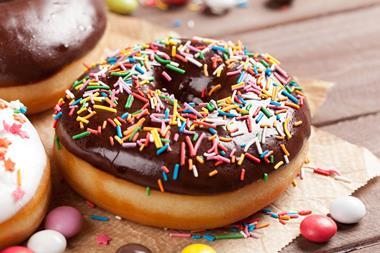

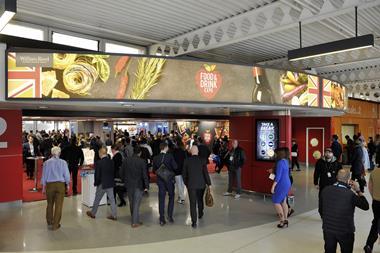

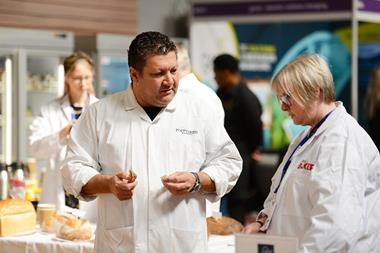


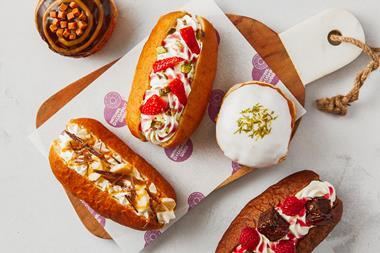
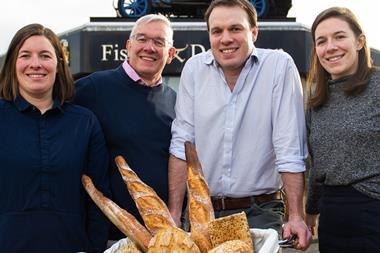


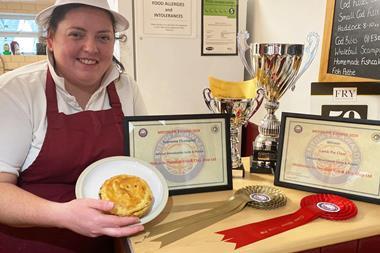

No comments yet